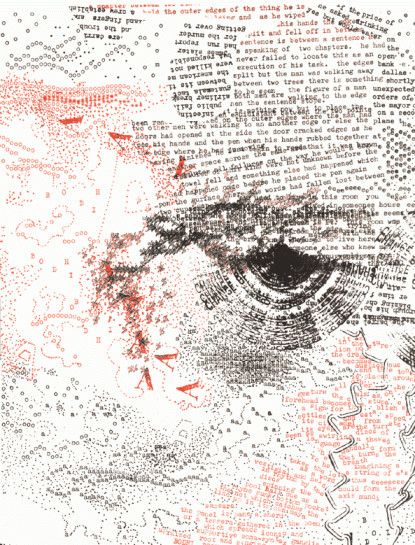Artists are too sensitive for life, says Deleuze (somewhere, but can not find the source, does anyone know?). They are traversed by an idea that is too overwhelming for them. This is quite a romantic view; nonetheless, it is certainly the case that sensitivity (of different varieties, for example, anxiety, migraines, depression, psychosis, schizophrenia) is often linked to creativity. Writing, claims one study, is a top ten profession for likelihood of depression. It is unclear to what extent these correlations are always causative, but it makes sense that many people sensitive to their environment, will feel the compulsion to express the sensitivity creatively, if anything as a sort of cathartic process, to get the overload of perceptions out of their system.
For many artists this overload of perception is indeed too overwhelming & they turn to intoxicating substances, or fail to regulate their temperament & become, what is usually dubbed, mad. Of course, many artists claim they take drugs precisely to stimulate a derangement of their senses. Dutch–Moroccan writer Hafid Bouazza (who edited a book on the rush/intoxication (De Roes) & is well-known for his experimentation with drugs, after rejecting Islam when he was 18) half facetiously claims in an interview that many artists turn to drugs precisely because they are not able to attain a perpetual state of creative output. In other words, drugs are there to replicate the moments of intoxication otherwise experienced when making art (Csikszentmihalyi’s popularized notion of Flow).
Another effect of supposedly being so keenly perceptive is that artists’ creations can therefore be expected to be informative documents about the subtleties & symptoms of their time. Deleuze thought of artists as symptomatologists of culture. Let us list some writerly/artist types, on a scale from frail/sickly to intoxicated, to mad, between which, naturally, a lot of overlap occurs
Frail / depressed / suicidal
Woolf, Rothko, Proust, Beckett, Warhol, Anne Sexton, Tennesse Williams, David Foster Wallace, Michael Jackson, Sylvia Plath, Crumb brothers, Robert Walser, and last but hardly least, Rogi Wieg (Dutch writer/painter/poet/musician who wrote a beautiful book about his mayor depression (that is a clinical term, not hyperbole) called Comrade Razorblade)
Intoxicated
Henry Miller, Pollock, Dylan Thomas, Beaudelaire, Elvis Presley, Charles Bukowski, William Burroughs, Malcolm Lowry, Jack Spicer, Tennessee Williams, Dylan Thomas, Dorothy Parker, Poe, Truman Capote, Kerouac, Faulkner, Hemingway, Raymond Chandler
Insane (clinically or otherwise)
Hunter Thompson, van Gogh, Stelarc, Alfred Jarry, Beethoven, Mozart, Michelangelo, Byron, Bobby Fischer, Dali, Caravaggio, Goya, Joyce, most HipHop artists
This is just an off-the-cuff, very roughly ordered list of writers and artists that come to mind right now; but by all means please help add more). It should be added here that Dutch (visual) poet Jürgen Smit has for some time now been compiling an already extensive and still expanding list of poets who died too young. Jürgen’s requirement for putting a poet on his list is that they died before the age of 35. Many of them committed suicide.
Are artists too frail for the world? What an unbearable cliché. & yet artists are statistically more likely to go mad. Perhaps they are mad first & then start making art. Perhaps everyone else is short of change? “There is after all nothing sane”, to paraphrase Krishnamurti, “about being able to live in an insane world.”
But sometimes artists take time out of their bouts of depression & apply their feelers toward the moment of their time, and create works that penetrate and distil some essence from some illness of our human ecology. Prescription drugs are surely, ironically, one of the most pressing, illest, symptoms of our Western moment. (They are no less a problem in Africa of course; but then, sadly, inversely so, i.e., for their disgustingly financially motivated, artificially maintained shortage).
Another illness includes the common person’s preclusion to pharmaceuticals (ok, am being facetious here. Although, I would take the drugstore cowboy’s lead if I had the right boots. (Incidentally, if you haven’t seen it, Burroughs makes a long cameo appearance as, well pretty much himself in this movie):
A third symptom of today is the still much too widely spread habit of the printed book. “Habit, however, is the chain that ties the dog to his vomit” (Brian Massumi). What, are we monks? No seriously, I love books, of course; think there should be more of them; but more alternative, experimental, unorthodox formats too, please. Of course many amazing alternatives are and have been & are being thought out. To name just a few examples:
Tom Phillips A Humument
Steve MacCaffery’s absolutely genius Carnival
The indefatigable derek beaulieu
Janneke Adema. Gary Hall, a.o, his concept of Liquid Books. Living Books About Life:
Multi-media & bio-poet Eduardo Caq, who recently created a new kind of poetry, Aromapoetry
Christian Bök. Most notably with his Xenotext Experiment
Danish poet Morten Søndergaard (1964) has contributed towards solving our problems with access or lack of pharmaceuticals, as well as our weariness with the common book. Word Pharmacy is Sondegaard’s proposition prescription; a portable pharmacy of words. Based on the Danish basic vocabulary of 1000 words (every language has such set, the minimal required for basic communication) containing 10 boxes for the most common kinds of words: articles, adverbs, adjectives, numerals, verbs, nouns, pronouns, interjections, prepositions, conjunctions. The always fabulastic Broken Dimanche Press
has recently brought out an English version based on the same basic word set for English.
The boxes are empty, apart from one user information leaflet each. Like Kamilla Löfström (review via Søndergaard’s website), I too was initially surprised & disappointed perhaps. Conditioned by my symptoms, I had expected & unconsciously perhaps hope for, strips & tabs of colourful pills. Of what possible use could instruction leaflets for words be?
Poetry can be lethal if not served in the right doses; unless, of course, if death is the desired effect. Jack Spicer’s last words: ”My vocabulary did this to me”. Either way, being able to decide on & apportion the correct doses of poetry into your poem is of vital importance. Unfortunately, most poetry makes most people sick, gag, or otherwise unwell. This is precisely because of the fatally misjudged distribution of ingredients by the poet, leaving the reader with barely any choice to properly treat herself. Some of the most common symptoms of a poetry that is already ill itself are the presence of an excess of ego, levitation, Beautiful Soul Syndrome, closed or false binaries, reification of nature.
Søndergaard prescribes us nothing but our own prescription. We are not beautiful souls. We are our own cancer no less than we are our own (medicinal) solution. Word Pharmacy enables precise treatment for one’s ailment right at the very root; where consciousness becomes expressed as language. Not the vague, melodramatic, ecstatic, lyrical language of the cancerous Poem of the Main Stream; but one of precise doses & detailed user information.
These poems do not have to be, but can be used as a mirror of the self, somewhat comparably to the way Conceptual poets Robert Fitterman & Vanessa Place mirror our most evil selves by appropriating respectively Holocaust Museum & Statement of Facts. The former appropriates captions of Holocaust photos without the photos; the latter are a.o. court statements appropriated Place’s practice as a defence attorney for sex offenders (I had never truly been scared to read a book until now, but I postponed opening this book for weeks, no kidding, and could hardly bear to read it when I began).
Word Pharmacy is a toolbox of virtual poems for any occasion. With virtual here is meant a real potential (Deleuzian) virtual, not a fleeting imaginary virtual. One can heal self, detox, regenerate. But one can also choose to get silly, get high, overdose. This poem, these virtual poems, do not treat its reader like a mindless version of a drunk, or junkie, who only needs a shot of some simple, pre-packaged affect. Word Pharmacy is dangerous not because its prescriptions can heal you or make you sick (they can), but because they enter into a precise assemblage with the assembled parts of their reader.
– – –
Some excerpts from the User Information Leaflets.
VERBS
”One of your first Verbs® might, for example, be the Verb® ’to be’, as in the sentence: I am hungry. Repeat this sentence. Continue on your own…You can use Verbs® if you would like to alter something, affect a condition. You would like to change the world. You can, for example, move a thing from one shelf to another… How to use Verbs®: Shout! Run! Shit! Sleep! Love! Die! Live! Get moving!”
NOUNS
“Generally speaking, however, Nouns® do however have a pleasant way of laying the world open, with their countless associations, recollections and concrete connections. Using Nouns® can cause your world to expand…Keep Nouns® in a dictionary, on a piece of paper, a shopping list, a wish list and well within reach of children.”
PRONOUNS
“Pronouns take a little while to work, usually about 14 days, but sometimes longer depending on who you are or are becoming.”
INTERJECTIONS
“Interjections® are your first words and in all probability also your last… and hey, you could interjection to hurl compact meaning into sentences. They are little work bonds. They are enough in themselves, they do not need to explain themselves. They carry their meaning within them, all pulled up and ready. Get it!?… shout. Screen. Whisper. Single. Do whatever the hell you like… they carried their fullest, but also the most indefinable meaning. You have to take them as they are. Okay!?
PREPOSITIONS
“Prepositions®… open and close. Not that positions are selfish, they are almost self-effacing, but make no mistake: they mean the world… in the sentence’ he sits on the beehive’ but he could just as easily be sitting on the underside of the beehive. Who can tell? Prepositions® can… despite being blind from birth day soon developed a piercing gaze. It positions in the eyes of language. They are invisible, but all seeing… trust them, but keep an eye on your back. Or under the table. Or above the door. Behind the curtain. They are liable to be wherever you least expect them.”
ARTICLES
“Do not use articles if: you do not want to be brought out of the indefinite and into the definite. Or: you do not want to be poured out of the definite hand into the indefinite … we do best in fog, in gas deposits, in transition and threshold areas, random regions, in terrain vague, borderlands, grey zones, in common, in the uncommon. We crop up and are found everywhere. We are articles®.”
CONJUNCTIONS
“Conjunctions® are very philosophical, they tell you what position to take in relation to something else… do not use conjunctions® if you are unable to integrate, coordinate or subordinates yourself… are subject to extreme mood swings or have psychotic tendencies.”
ADVERBS
“Adverbs® are the problem children of language. They are difficult and maladjusted, but they are also charming and artistic… not, cry the adverbs. They say: unfortunately. Again. Perhaps, naturally, nonetheless! Outside, here? Suddenly, never!”
NUMERALS
“Numerals®…tell and they tell… they know when you were born and they will know when you die… count to 10 if you want to control yourself. Or if you want to test the microphone. Numerals® can also be used for things such as hypnosis or hide and seek.”
ADJECTIVES
“Adjectives® have no independent existence. This means that they, like all others, must find a noun or a name to latch onto. They are akin to ticks, fees and other parasites. Or comedians, clerics and politicians. Adjectives® are there to add something. They say: look, there is much more here than you think!”











I am in fact thankful to the owner of this web page who has shared
this enormous paragraph at here.